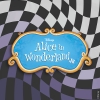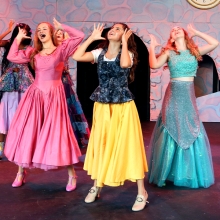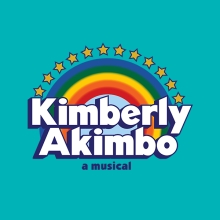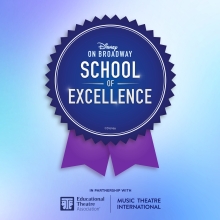Filichia Features: Better Nate Than Ever Is the Best
Filichia Features: Better Nate Than Ever Is the Best
"Every moment in life is an audition," writes Tim Federle in Better Nate Than Ever. If that’s true, Federle’s audition as a writer gets him the part as The Country’s Most Promising Young Adult Novelist. This is the finest book for teens that I’ve ever read -- and I’m including the nine that I wrote.
Thirteen-year-old Nate Foster is a Broadway baby who has been fated to live in woeful Jankburg, Pennsylvania. What a humiliation for someone who believes that “Wicked is like half the reason for New York to exist.” (Everybody has to go through stages like that.)
When Nate and best-friend Libby learn that Broadway’s upcoming E.T.: The Musical is looking for its Elliott, he’s desperate to try out. Now fate is kinder: Nate’s parents are taking some time off to rekindle their endangered marriage and are leaving him in the care of older brother Anthony. But Big Brother has his own plans during this time without parental supervision, and they don’t include keeping a watchful eye on Nate. Here’s our hero’s chance to bus to New York, have his audition, get the part and be home before anyone notices. Nate knows the risks if he’s caught: “Mom'll send me right to school,” he moans, “or Dad'll kill me and then send my body to school."
But, unlike most of us, Nate has the courage to follow through. He may be a mere 13, but he’s already read enough books to theater craft to know that when you’re acting, you’re smart to “play the opposite.” Ironically, he winds up inadvertently taking his own advice when he auditions.
That happens soon after Nate arrives in the Big Bad Apple. He had learned that Broadway "was a collection of the greatest theaters on the planet," but he “didn't know it was a street," too. At first, the reader may wonder why Nate doesn't detour and bask in the glory of 44th and 45th Streets. That, however, reiterates Nate is one of another hundred people who's come to work, not to play.
Federle provides all the grandeur of what makes this city great: the opportunity to have your life completely change for the better in a single day; a place where you have the freedom to be yourself; a mecca where you can find like-minded people – and the absence of those little-town blues. After Nate sees that his aunt works at "the kind of restaurant that gets reviewed in the New York Times,” he notes that “back home, the only restaurants that get written up are those that violate health codes."
Thus, to say that Better Nate Than Ever is a Valentine to New York City would be an understatement. Let’s call the book an entire Valentine section of a card shop. Nate’s one day on the town confirms his hunch that in New York is a place where a person “doesn't have to change anything to fit in." As he’ll later tell his aunt, "You don't know bad it is in Jankburg for someone like me. You don't know the words they call me." New York instead is, he says, "what 13 years of torture have prepared me for.

And yet, Federle plays fair with this dear old dirty town by admitting that it’s not always the Emerald City. Nate admires how New Yorkers ignore "Walk/Don't Walk" signs with half-closed eyes – until he sees an unaware jaywalker almost hit by a Honda. When he goes to the building in which his aunt lives, he notes that hallway "looks just like your junior high school." Once he gets inside, he see "a bare white box with big clanging pipes and one framed show poster from a production of Grand Hotel at the Walnut Street Theatre." And yet, he proves that he’s a New Yorker-in-waiting when he drools that "It's heaven."
He’s thrilled when his aunt’s roommate is "talking to me like I'm a real actor." More to the point, "I just can't believe I'm talking about theater with another guy and he's not slamming my face in a toilet." Then, when he learns this man he’s enjoyed talking to is gay, he’s a bit unnerved (more than he would have expected, by the way). This does, however, become another occasion to which Nate rises.
Where his own sexuality is concerned, Nate unapologetically states “I am undecided.” What an honest and smart kid! He knows there’s no expiration date on when one must declare allegiance to one lifestyle or the other. Nate is open-minded in many ways, so why not be open-minded here, too? And he certainly feels a good deal for Libby.
If sex isn’t yet a complication, the plot offers another. Nate has “an antiquated Nokia” (which probably means that it was manufactured in 2005), so he constantly runs the risk of its running out of juice. Federle makes such a will-it-or-won’t-it work drama out of that Nokia that you’ll experience the same nail-biting feeling you had while watching James Bond in Goldfinger experience that piercing laser beam inching up between his legs. With a bum phone, how can Nate hear if he got a call-back? He also needs to stay in touch with Libby to see if anyone back home has wised up to his plan. Luckily, an early call to the girl results in her telling him "You are boss!" – which Nate regards as the greatest compliment she’s ever given him. He fully admits that "usually she's boss and I'm not even vice-boss.
Given that so many of today’s kids have mouths filthier than a bathroom in an off-off-Broadway theater, Federle did have to deal with profanity. But what a brilliant way that he circumvents it: instead of using words that are heard every few minutes in The Book of Mormon, Nate and Libby use the names of Broadway flops as their curse words. “Oh, Dance of the Vampires!” they might yell when infuriated. (Will Elizabeth Swados be offended at “Oh, Doonesbury!”? If so, let the punishment fit the crime; her music was the reason that the show failed.)
But Federle’s ace trump is the way he’s characterized Nate. Many of us, when we want to tell a listener a fact that is patently obvious, might drone out the cliché of “Is the Pope Catholic?” or refer to a bear’s defecation habits in the woods. But Nate is much smarter and more verbal than that; his choice for an isn’t-it-obvious remark is "Is Christine Daae's high note pre-recorded in Phantom?"

Federle, a Pennsylvania native who later landed roles in the 2003 Gypsy, Chitty Chitty Bang Bang, The Little Mermaid and Billy Elliot, knows about dreams. Nate says matter-of-factly, "I've got some ideas for a new autograph." Later when he’s on the phone trying to keep his whereabouts from his parents – and succeeding – he muses “How much sharper my improv skills are since moving to New York.”
“Since moving to New York.” Doncha love it? He wants to be a part of it, New York, New York, so much that he’s convinced himself that he’s already “moved” here – which is far from accurate. But that wishful thinking is the way he genuinely feels. He’s indeed on his way to becoming a better Nate than ever.
While this is ostensibly a book for young adults, even senior citizens can return to their youth thanks to Nate’s dreams and passions; the smiles on their faces will be balanced by the tears in their eyes. Seriously: a musical theater enthusiast is never too old to appreciate this book.
Federle will even make readers want to watch E.T. again – but not until they’ve finished reading Better Nate Than Ever two or three times in a row. The ultimate compliment for any book is either that it’s a “page-turner” or that “I couldn’t put it down.” Better Nate Than Ever easily fits those descriptions, but does them one better. It’s so genuinely gripping that when you turn the page and are about to read what's at the left-hand top, your eyes tend dart to the right-hand bottom. You can’t bear to wait a second longer than necessary to see what's going to happen to this wonderful kid that you’ve either been or is right now. They don’t come any better than Better Nate Than Ever.

Read all of Filichia’s Features!
Visit Peter’s Official Website.
Check out Peter’s weekly column each Tuesday at www.masterworksbroadway.com and each Friday at www.kritzerland.com.
Peter’s newest book, Strippers, Showgirls, and Sharks: A Very Opinionated History of the Broadway Musicals That Did Not Win the Tony Award,is available for pre-order NOW!


























